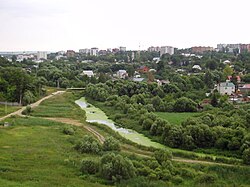Kursk
| Kursk (English) Курск (Russian) |
|
|---|---|
| - City - | |
 View of Kursk |
|
 Location of Kursk Oblast in Russia |
|
|
|
|
|
|
|
|
|
|
| City Day | September 25 |
| Administrative status (as of November 2008) | |
| Country | Russia |
| Federal subject | Kursk Oblast |
| Administratively subordinated to | city of oblast significance of Kursk |
| Administrative center of | Kursk Oblast,Kursky District, city of oblast significance of Kursk |
| Municipal status (as of December 2010) | |
| Urban okrug | Kursk Urban Okrug |
| Administrative center of | Kursk Urban Okrug, Kursky Municipal District |
| Head | Alexander Zakurdayev |
| Representative body | Kursk City Assembly (Russian: Курское городское Собрание) |
| Statistics | |
| Area | 188.75 km2 (72.88 sq mi) |
| Population (2010 Census) | 415,159 inhabitants |
| - Rank in 2010 | 42nd |
| Density | 2,200/km2 (5,700/sq mi) |
| Time zone | MSK (UTC+03:00) |
| First mentioned | 1032 |
| City status since | 1779 |
| Postal code(s) | 305000 |
| Dialing code(s) | +7 4712 |
|
|
|
| on | |
Kursk (Russian: Курск; IPA: [ˈkursk]) is a city and the administrative center of Kursk Oblast, Russia, located at the confluence of the Kur, Tuskar, and Seym Rivers. The area around Kursk was the site of a turning point in the Soviet–German struggle during World War II and the site of the largest tank battle in history. Population: 415,159 (2010 Census);412,442 (2002 Census);424,239 (1989 Census).
Archaeology indicates that the site of Kursk was settled in the 5th or 4th century BCE. The settlement was fortified and included Slavs at least as early as the 8th century CE.
The first written record of Kursk is dated 1032. It was mentioned as one of Severian towns by Prince Igor in The Tale of Igor's Campaign: "Saddle, brother, your swift steeds. As to mine, they are ready, saddled ahead, near Kursk; as to my Kurskers, they are famous knights—swaddled under war-horns, nursed under helmets, fed from the point of the lance; to them the trails are familiar, to them the ravines are known, the bows they have are strung tight, the quivers, unclosed, the sabers, sharpened; themselves, like gray wolves, they lope in the field, seeking for themselves honor, and for their prince, glory."
...
Wikipedia



